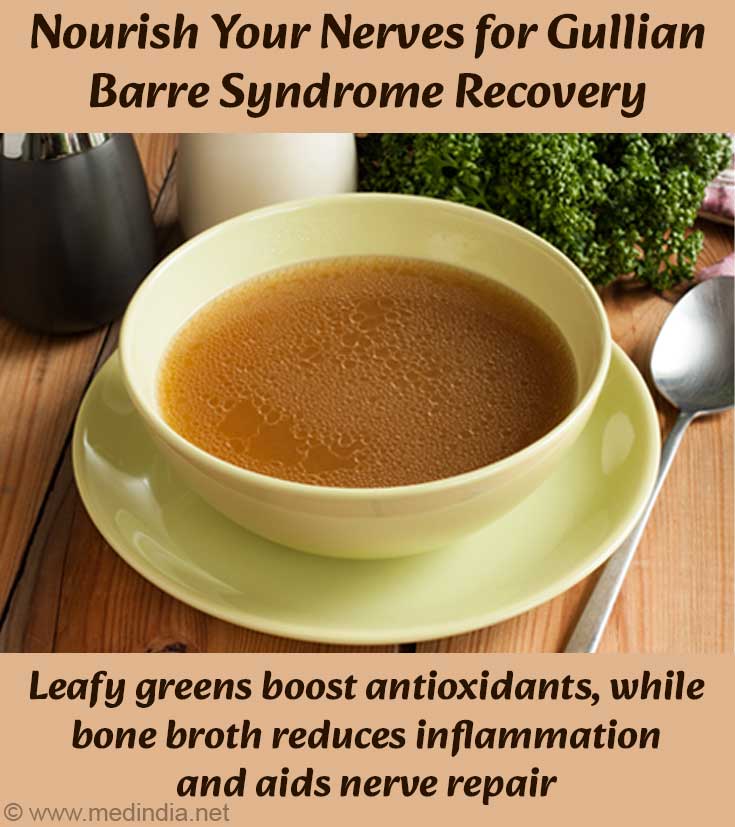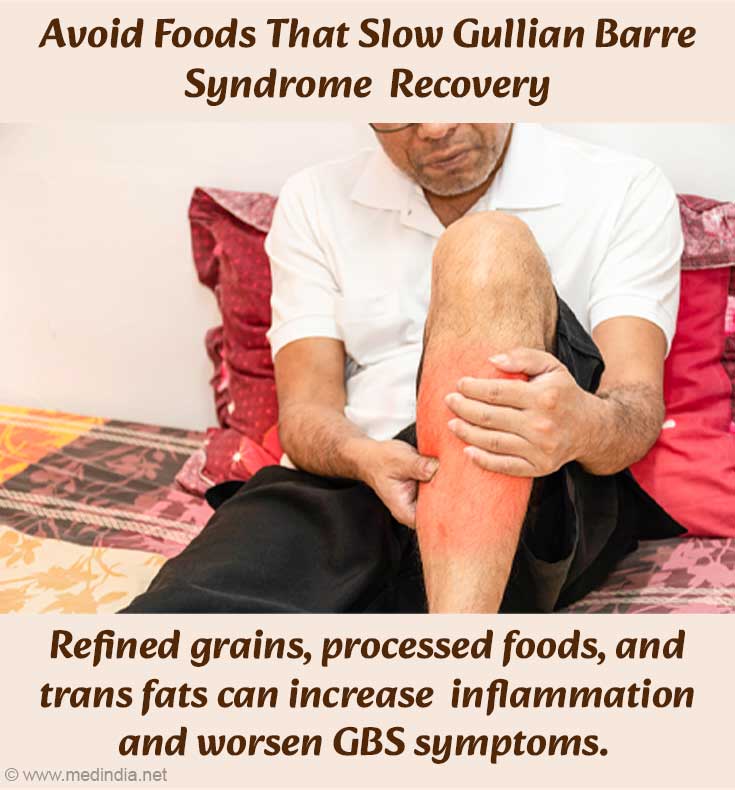- Treatment guidelines for Guillain-Barre Syndrome - (https://pmc.ncbi.nlm.nih.gov/articles/PMC3152164/)
- Health Benefits of Plant-Derived Sulfur Compounds, Glucosinolates, and Organosulfur Compounds - (https://pmc.ncbi.nlm.nih.gov/articles/PMC7503525/)
- Analysis of the Anti-Inflammatory Capacity of Bone Broth in a Murine Model of Ulcerative Colitis - (https://pmc.ncbi.nlm.nih.gov/articles/PMC8618064/#sec2-medicina-57-01138)
- Epigallocatechin-3-gallate (EGCG) attenuates peripheral nerve degeneration in rat sciatic nerve crush injury - (https://pubmed.ncbi.nlm.nih.gov/23313191/)
- Treatment of Guillain-Barre syndrome with Bifidobacterium infantis through regulation of T helper cells subsets - (https://www.sciencedirect.com/science/article/pii/S1567576918302662)
- A novel approach to mitigate muscle atrophy in Guillain-Barre syndrome - (https://accscience.com/journal/AN/2/2/10.36922/an.280)
- Coexistence of Guillain-Barre Syndrome and Subacute Combined Degeneration of the Spinal Cord Due to Autoimmune Gastritis: A Case Report and Literature Review - (https://pmc.ncbi.nlm.nih.gov/articles/PMC11270142/)
- Uncommon dyselectrolytemia complicating Guillain-Barre syndrome - (https://pmc.ncbi.nlm.nih.gov/articles/PMC3821428/)
- An uncommon complication of Listeria monocytogenes infection: Polyradiculoneuritis following Listeria meningoencephalitis - (https://pmc.ncbi.nlm.nih.gov/articles/PMC6010957/)
About
Guillain-Barré Syndrome (GBS) is a rare autoimmune disorder that affects the peripheral nervous system, causing progressive muscle weakness and loss of reflexes. Although there is no definitive cure, a well-balanced diet can help manage symptoms and support recovery. This article explores the best dietary choices for individuals with GBS and identifies foods to avoid(1✔ ✔Trusted Source
Treatment guidelines for Guillain-Barre Syndrome
Go to source).
Did You Know?
Leafy greens, bone broth, and fermented foods can support nerve health and recovery from GBS. #gbs #nutrition #medindia
Foods to Eat for Managing GBS
A nutrient-rich diet can help strengthen the immune system, reduce inflammation, and support nerve regeneration. A high-energy diet (40–45 non-protein kcal) and high-protein intake (2–2.5 g/kg) are advised to minimize muscle wasting and support respiratory weaning. Continuous enteral feeding is generally better tolerated than bolus feeding in severe cases(1✔ ✔Trusted Source
Treatment guidelines for Guillain-Barre Syndrome
Go to source).
Below are some foods that are particularly beneficial for individuals with GBS.
1. Leafy Greens and Sulfur-Rich Vegetables
Vegetables such as kale, cabbage, Brussels sprouts, and broccoli contain sulfur compounds that help protect nerve cells from damage. These vegetables also provide essential vitamins and antioxidants that enhance immune function(2✔ ✔Trusted Source
Health Benefits of Plant-Derived Sulfur Compounds, Glucosinolates, and Organosulfur Compounds
Go to source).

2. Bone Broth
Rich in collagen, amino acids, and minerals, bone broth can help reduce inflammation.. It is also beneficial for individuals who experience difficulty swallowing. Recent studies indicate that bone broth possesses anti-inflammatory properties that may benefit individuals with ulcerative colitis (UC) by reducing symptoms. Additionally, its nutrient-rich composition could support recovery in Guillain-Barré Syndrome by promoting nerve health and reducing inflammation.
While it may also support recovery through similar mechanisms, more research is needed to confirm its specific benefits for nerve repair in that context(3✔ ✔Trusted Source
Analysis of the Anti-Inflammatory Capacity of Bone Broth in a Murine Model of Ulcerative Colitis
Go to source).
3. Green Tea
Green tea contains epigallocatechin-3-gallate (EGCG), a powerful antioxidant that helps regulate immune responses and prevent excessive nerve damage. Epigallocatechin-3-gallate (EGCG) prevent nerve damage by reducing inflammation and apoptosis in nerve cells following injury. The study indicates that EGCG enhances nerve regeneration, improves functional recovery, and normalizes the expression of apoptosis-related genes, contributing to better neurological health(4✔ ✔Trusted Source
Epigallocatechin-3-gallate (EGCG) attenuates peripheral nerve degeneration in rat sciatic nerve crush injury
Go to source).
4. Fermented Foods
Probiotic-rich foods such as kimchi, yogurt, and sauerkraut promote gut health and enhance immunity. The presence of beneficial bacteria like Bifidobacterium is crucial for maintaining a healthy gut microbiome, which plays a significant role in reducing autoimmune responses and inflammation. This is particularly beneficial for individuals with Guillain-Barré Syndrome (GBS), as the regulation of T helper cell subsets by probiotics can help alleviate symptoms associated with the condition(5✔ ✔Trusted Source
Treatment of Guillain-Barre syndrome with Bifidobacterium infantis through regulation of T helper cells subsets
Go to source).
5. Essential Vitamins and Minerals for Nerve Repair
In addition to the foods mentioned above, several vitamins and minerals are essential for nerve repair and may aid in recovery from Guillain-Barré Syndrome:
- Omega-3 Fatty Acids: Found in fatty fish (like salmon, mackerel, and sardines), flaxseeds, and walnuts, omega-3 fatty acids are known for their anti-inflammatory properties and support nerve health by promoting regeneration(6✔ ✔Trusted Source
A novel approach to mitigate muscle atrophy in Guillain-Barre syndrome
Go to source). - Vitamin B12: Vitamin B12 plays a significant role in nerve health and myelin regeneration, which is crucial for recovery from Guillain-Barré syndrome (GBS). Adequate levels of vitamin B12 can support the body's ability to repair damaged nerves, potentially improving recovery outcomes for individuals affected by this condition(7✔ ✔Trusted Source
Coexistence of Guillain-Barre Syndrome and Subacute Combined Degeneration of the Spinal Cord Due to Autoimmune Gastritis: A Case Report and Literature Review
Go to source). - Magnesium: Vital for nerve function, magnesium helps reduce inflammation. It is found in nuts, seeds, whole grains, and leafy green vegetables. Magnesium is not a primary treatment for Guillain-Barré syndrome (GBS), but it has been observed that alterations in magnesium levels, such as hypomagnesemia, can occur in GBS patients. Maintaining proper magnesium levels may support nerve function and overall health during recovery from GBS(8✔ ✔Trusted Source
Uncommon dyselectrolytemia complicating Guillain-Barre syndrome
Go to source).
Foods to Avoid for GBS Management
Certain foods may exacerbate inflammation and worsen symptoms. It is advisable to limit or eliminate the following from the diet:

- Refined Grains (such as wheat, rice, and oats) – May contribute to inflammation and digestive issues.
- Dairy Products (such as cheese, butter, and cream) – Can trigger inflammatory responses in some individuals. Listeria monocytogenes is often found in unpasteurized dairy products and can cause listeriosis, which may lead to neurological complications, including Guillain-Barré syndrome (GBS). The bacteria can trigger inflammatory responses in susceptible individuals, potentially exacerbating autoimmune conditions like GBS(9✔ ✔Trusted Source
An uncommon complication of Listeria monocytogenes infection: Polyradiculoneuritis following Listeria meningoencephalitis
Go to source) - Processed, High-Sodium, and Sugary Foods – High sodium and sugary foods can worsen the symptoms of Guillain-Barré syndrome (GBS) by promoting inflammation and adversely affecting immune function. Elevated sodium intake may result in fluid retention and increased blood pressure, complicating the recovery process.
Similarly, a diet high in sugar can impair immune response, leading to systemic inflammation. This connection highlights the critical role of dietary management for individuals with GBS, as specific food choices can significantly impact symptom severity and overall recovery outcomes().
Understanding Guillain-Barré Syndrome
GBS occurs when the immune system mistakenly attacks the nerves, leading to symptoms such as numbness, muscle weakness, and, in severe cases, paralysis. The exact cause remains unclear, but viral and bacterial infections, surgical procedures, and other triggers may contribute to its onset. Early detection and proper medical care can minimize complications and improve recovery outcomes.
Symptoms of Guillain-Barré Syndrome
GBS can manifest with a range of symptoms that vary in severity. These may include:
- Muscle weakness or tingling in the limbs
- Impaired balance and coordination
- Vision problems
- Difficulty chewing or swallowing
- High blood pressure
- Paralysis of respiratory muscles
Since symptoms can escalate quickly, prompt medical attention is crucial for effective management.
While there is no cure for







